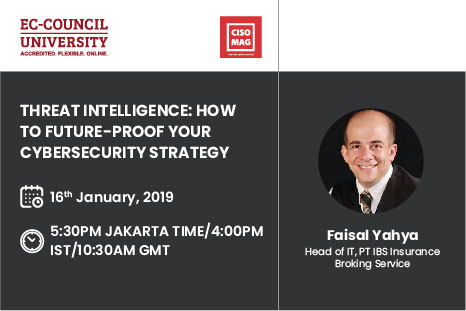
Name: Faisal Yahya, Head of IT, PT IBS Insurance Broking Service
Topic: Threat Intelligence: How to Future-Proof your Cybersecurity Strategy
Date of Webinar: 16th January, 2019
Time and Location: 5:30pm Jakarta Time/4:00pm IST/10:30am GMT
Speaker Bio: Faisal has two decades of progressive leadership experience in Cybersecurity, IT Strategy, and Enterprise Architecture. Engaged with the Asian IT communities, actively researching, speaking and advocating for better Cybersecurity practices and defining improved IT Quality Assurance. Experience in white paper development, capability briefings, technical presentations to clients and technical writing. Playing an integral role in spearheading all Integration of IS/IT, IT Strategy, Project Management, Vendor Management, Program Management, and Business Process Improvement. He is self-driven, forward-thinking, highly-versatile, innovative, and a hands-on, Chief Information Officer of a reputable Insurance Broking in Indonesia. Faisal is an official and Certified EC-Council Instructor (CEI) for CCISO certification.
Apart from coaching the next generation leaders, Faisal actively engages with the IT communities within the region, giving time on researching, speaking at public conferences and advocating on better Cybersecurity practices and defining improvements in the IT Quality Assurance space. He is passionate about applying the latest technology securely and efficiently.
Topic Abstract:
CyberSecurity is a holistic and ‘equilibrium-like’ of protection, detection, and response. Over the past few years, we’ve started seeing Threat Intelligence products and services. Security operation teams are consolidating them into their arsenal as the reason for two trends in computing.
First, companies practically have nearly lost control of our computing environment. Our data is mostly held in the cloud by other services provider’s companies. Moreover, our networks likely are outsourced, and security tools are disjointed. This situation makes the response far more complicated and involved manual tasks because we might not have visibility into all parts of our critical network infrastructures and no automation and integration framework to quickly prevent successful cyberattacks.
Second, attacks are getting more sophisticated. The rise of APTs (advanced persistent threats), ransomware, cryptojacking – attacks that specifically target for reasons other than pure financial theft – brings with it a new variety of attacker, which requires a different threat model. The situation is getting worse as hacking becomes a more integral part of geopolitics, unrelated networks are increasingly collaterally damaged in nation-state fights. These ever-increasing number of cyberattacks requires the integrated cybersecurity platform and powerful machine learning to detect, analyze, predict, automate and defend against the cyber threats in nearly real-time.
In this session, we discuss the concept of cyber threat intelligence and its main challenges and opportunities for 2019 toward future-proof cybersecurity strategy, and then briefly introduce the integrated security platform which can addresses the current difficulties of disjointed tools and how to leverage threat intelligence to prevent latest cyberattacks and use security automation as much as possible.
*Examples, analysis, views and opinion shared by the speakers are personal and not endorsed by EC-Council or their respective employer(s)








